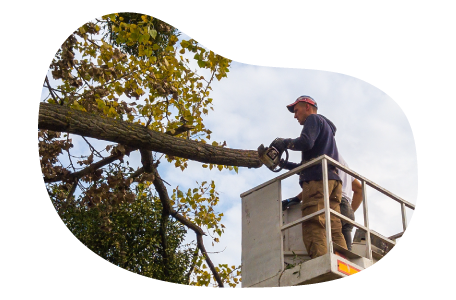
Tree care insurance that protects your business
Tree maintenance is high-risk work, and as a result, tree companies deal with big liability. A tree branch could fall and damage power lines or cause injuries, leading to a lawsuit. Insurance helps small businesses shoulder the legal and financial burden of property damage, theft, and accidents.

Find affordable coverage
Tree service professionals can save money by comparing free quotes for insurance coverage from top-rated insurance companies.
Fill out Insureon's easy online application to get quotes and advice from a licensed insurance agent.
What types of insurance do tree service businesses need?
These insurance policies cover the most common risks of tree care.
General liability insurance
General liability helps pay for third-party accidents, such as a client tripping over an arborist’s equipment. Bundle it with commercial property for savings in a business owner's policy (BOP).
- Customer bodily injuries
- Damaged customer property
- Product liability insurance
Workers’ compensation insurance
Most states require workers' comp insurance for tree service businesses that have employees. It also protects sole proprietors from work injury costs that health insurance might deny.
- Employee medical expenses
- Disability benefits
- Employee injury lawsuits
Tools and equipment insurance
This policy helps pay for repair or replacement of a tree trimmer’s climbing gear, pruners, chainsaws, pesticide sprayers, and other tools wherever you bring them.
- Equipment less than five years old
- Business property that travels to jobsites
- Tools valued at less than $10,000
Commercial auto insurance
A commercial auto policy covers the cost of accidents involving a tree care company’s vehicle. Each state has its own requirements for auto liability policy limits.
- Property damage caused by your vehicle
- Bodily injuries in an accident
- Vehicle theft and vandalism
Business owner's policy
A business owner's policy, or BOP, is a cost-effective way for tree service businesses to buy a general liability policy and commercial property insurance together.
- Customer injuries
- Accidental damage to customer property
- Damage to your building or its contents
License and permit bonds
Tree service technicians often need a bond to get licensed in their state or to do certain kinds of work. A bond provides a financial guarantee that your business will comply with regulations.
- State licensing requirements
- Tree removal permits
- Pesticide application permits
How much does arborist and tree service insurance cost?

A small tree trimming business will pay less for insurance than a larger company.
Factors that affect tree service insurance premiums include:
- Tree services offered, such as commercial or residential
- Business property and equipment
- Business income
- Types of insurance coverage purchased
- Policy limits and deductibles
How do I get tree service business insurance?
It's easy to get tree service business insurance and license/permit bonds if you have your company information on hand. Our application will ask for basic facts about your business, such as revenue and number of employees. You can buy a policy online and get a certificate of insurance with Insureon in three easy steps:
- Complete a free online application
- Compare insurance quotes and choose policies
- Pay for your policy and download a certificate
Insureon's licensed agents work with top-rated U.S. providers to find coverage options that fit your tree trimming or tree removal business, whether you work independently or hire employees.
Verified business insurance reviews
Hear from customers like you who purchased small business insurance.
Common questions about insurance for tree service businesses
Review answers to frequently asked questions (FAQs) about tree service business insurance and more.
Are tree service companies required to be licensed and insured?
In most states, obtaining a license is mandatory for tree removal and service businesses, however the exact licensing requirements will vary by state. Some requirements may include education, industry experience, business registration, certifications, permits, bonds, and insurance.
Additionally, there are two types of licenses you may be required to have: an arborist license and a contractor's license.
The International Society of Arboriculture (ISA) and the Tree Care Industry Association (TCIA) provide accredited certifications, which may be required to get some contracts or work in certain municipalities.
Some examples of state license requirements are:
- Oregon: In the state of Oregon, all tree service businesses must register with the Oregon State Construction Contractors Board, which guarantees the business is bonded and insured.
- Alabama: Any tree work business in Alabama must pass a written examination to obtain their Alabama tree surgery license. Additionally, some counties and cities may require registration or permits before performing any tree work.
- Massachusetts: There are no licensing requirements for tree work companies and arborists in Massachusetts. However, becoming an MA Certified Arborist can make your business stand out from the competition.
What other arborist insurance policies do I need?
Small business owners of tree service companies, LLCs, and independent contractors may need additional types of insurance beyond those mentioned above.
Some other tree service insurance policies to consider are:
- Hired and non-owned auto (HNOA) insurance is recommended for tree service workers who drive their own pickup or other vehicle to clients' properties, because personal auto insurance won't cover business use. HNOA provides auto liability coverage for personal, leased, and rented vehicles used by your business.
- Commercial property insurance covers your building and its contents, such as pesticides, fertilizer, and clippers. It protects against financial losses from fires, storms, and burglaries.
- Business personal property (BPP) coverage can be added to your general liability policy to protect business property kept at a designated location, though you may not have a building.
- Tools and equipment insurance, a form of inland marine insurance, protects your landscaping business's tools and equipment while they're in transit or at a jobsite. It covers newer items valued at less than $10,000, such as hedge trimmers, lawn mowers, and other equipment.
- Commercial umbrella insurance boosts the protection of your general liability, commercial auto, and employer's liability insurance, activating when the limit is reached on the underlying policy.
- Business interruption insurance, also called business income insurance, covers lost revenue and other expenses should a covered event, like a fire, temporarily close your business. It can usually be added to your commercial property policy.
